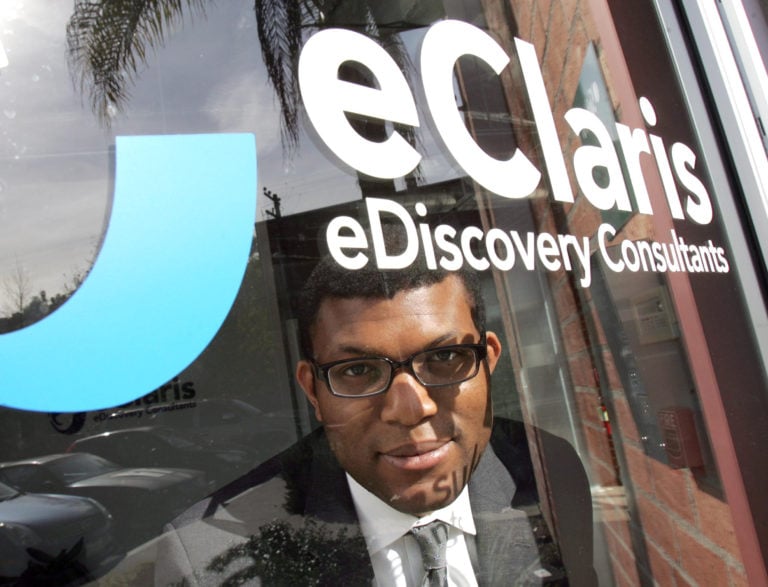
When the financial crisis hit in late 2008, the industry Jacques Nack Ngue had just jumped into went from more than 50 percent annual growth to a screeching halt.
Ngue had joined the ranks of electronic-discovery consultants, which law firms and corporations were increasingly relying on to process an ever-expanding amount of data from e-mails to Facebook profiles that could be relevant to lawsuits.
But the downturn, combined with an explosion of competitors, triggered a dramatic price drop. Some clients started paying one-tenth the money that they previously had for e-discovery. Revenue at Ngue’s local firm, eClaris, fell by half, forcing him to lay off three of eight employees.
“It was a tough year,” he said. “We were very aware that we were going to have to adjust.”
But since then, Ngue – and much of the rest of the industry – has bounced back by diversifying into other revenue streams and by focusing on giving clients fewer but more targeted documents.
Today, there are more than 800 companies providing e-discovery services, compared with 600 in 2008, when the industry shrank nearly 10 percent, according to a study by industry consultants Socha Consulting LLC and Gelbmann and Associates.
Responding to pressure to keep costs low, more e-discovery firms are marketing themselves as strategists that can zero in on important documents and minimize the amount of data that needs to be handled.
In the past, for example, a company that suspected an employee of giving away trade secrets may have hired an e-discovery firm that would simply collect the employee’s e-mails and computer files. It would index and sort the files and essentially turn the bulk over to a client company’s lawyers for review.
Now, however, e-discovery firms are increasingly paid to work early on with clients to understand more precisely what they’re looking for. Using new and more powerful software filters, they can give the lawyers fewer but more relevant documents.
“What I see happening is a move toward what’s more akin to trying to figure out where to sit in a warehouse full of documents and where you should look, instead of opening every box in the warehouse,” said George Socha, president of St. Paul, Minn.-based Socha Consulting.
Changes
The brief history of e-discovery companies has been a story of adaptation.
In the mid-2000s, many firms that had handled document copying and scanning for law firms began investing in equipment and hiring experts in order to bid for e-discovery projects. Companies stocked up on computers and licensed expensive software that enabled them to do everything from extract data to turn files into images.
But Bryon Bratcher, who runs the West Coast and Asian e-discovery operations for Pittsburgh-based Reed Smith LLP, said law firms are no longer willing to pay what they did previously.
“We certainly are feeling the heat from our clients in terms of the costs,” he said. “If you don’t catch it correctly at the beginning, it can snowball.”
Among the document processing firms that have responded to the pressures to lower costs are downtown L.A.’s CP Document Technologies and Phoenix-based Encore Discovery Solutions.
George Mazares, Encore’s chief executive, said the company is placing greater emphasis on consulting with clients to throw out unnecessary data early on. Also, new technology allows companies to target data before the heavy lifting of indexing and converting it for attorney review. For example, new software is better at searching large stores of data for concepts instead of just keywords, helping bundle possibly related documents.
“This is a new industry,” said Mazares, based in the company’s downtown L.A. office. “I think there’s been a move toward what I’ll call knowledge-based services.”
Oliver Solis, sales representative in CP’s digital department, also said that most of his department’s work is now related to assessing cases early.
“You’ve got to go with the flow,” he said. “If we were only doing data processing, we wouldn’t be able to be assisting law firms with the cases they’re working on.”
As for Ngue, he invested $1.5 million in the last two years in equipment and staff to expand services.
Like CP and Encore, eClaris is getting more work with clients at the beginning of a project. The company’s new services include data analysis that can, for example, determine whether files have been deleted. The company also sells software it’s developed on its own that clients can use to store, log, and manage documents. It even provides e-discovery training to clients.
Whereas the old form of e-document processing once was the bulk of his business, it has dropped to as low as 30 percent. The moves seem to have paid off. In 2010, the company saw revenue jump by 500 percent, and Ngue hired 15 additional employees. The company moved from downtown Los Angeles to a larger office in South Pasadena in July.
“We had a complete turnaround in the early part of the year,” Ngue said. “It made us more of a company you really hire for expertise.”
